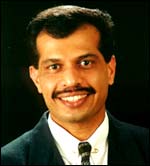Home > US Edition > The Gulf War II > Report
Indian American military doctor against war
Suleman Din in New York |
March 26, 2003 23:16 IST
As a psychiatrist with the US military who treats soldiers suffering from post-traumatic stress syndrome, Dr Hemant Thakur knows what plagues people in war.
It is a knowledge that Thakur has gained from treating soldiers who have fought in every conflict that America has been involved in since World War II, including the Battle of the Bulge and D-Day.
The killing of unarmed civilians is something that worries him, and such casualties are likely to rise as US-led forces get closer and closer to Baghdad, Iraq.
"Even trained killers... killing innocents haunts them for years," said Thakur, a 47-year-old lieutenant colonel with the US Army Reserves, attached to the 325th Field Hospital in Independence, Missouri.
"Fighting a street war is much different from fighting in the jungle; you don't know who you're fighting," he said, reflecting on the resistance and guerrilla tactics being used by Iraqi fighters.

Thakur is opposed to the reasons for going to war for these and other reasons.
"The war is very controversial," he said.
Nearly 95 per cent of the former soldiers he treats feel that the current war will serve the interests of a few.
"No one says that Saddam Hussein is nice, and I'm not saying that we don't fight in wars -- but I openly say that we are not there [Iraq] for the right reasons,” he said.
Thakur said that the call to go to Iraq could come at anytime. In the field he has a variety of roles -- operating as an ER surgeon for battle trauma [Thakur is also an MD) and as a psychiatrist. His unit, he said, could build a completely functioning hospital “anywhere in three days”.
His last assignment took him to Japan just a few months ago, where he was the only doctor for US forces engaged in wargames.
"[The North Koreans] are the bigger threat. Why aren't they doing something about them?" Thakur asked.
Americans addicted to watching news and seeing images of bloody marines and prisoners of war would also suffer, he said.
"It's okay to see to a certain extent, but [such coverage] can create a lot of anxiety," he said.
Thakur currently works at the Kansas City Veteran Affairs Medical Centre, meeting weekly with veterans still struggling with memories and emotional scars from battles.
He developed a rehabilitation programme that dramatically improved the lives of many veterans.
It was a six-step plan to distil the choices that people make in life into a matrix of what is good for them. He put his plan into writing, and in 2000 his book, Mega-Mind: Path to Success and Freedom, was published.
In putting the plan together, Thakur studied the lives of successful individuals whom others could emulate, especially Mahatma Gandhi and Martin Luther King.
Within this system, Thakur explained that patients come to understand that they are part of the overall universe and its energy, and their actions affect it, and vice versa.
It is this perspective that shapes his attitude towards war and conflict. "When you fight a war, you waste nature's energy," he said. "You're just fighting over dirt."